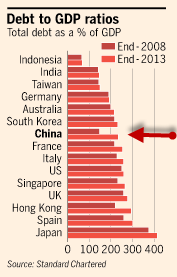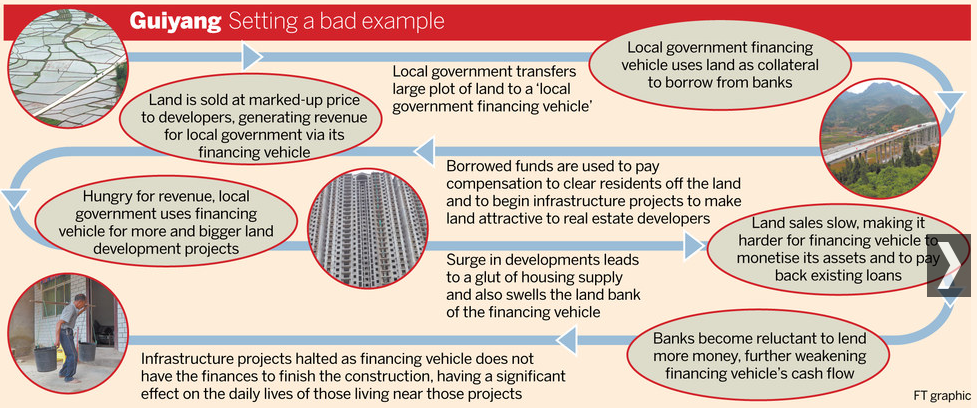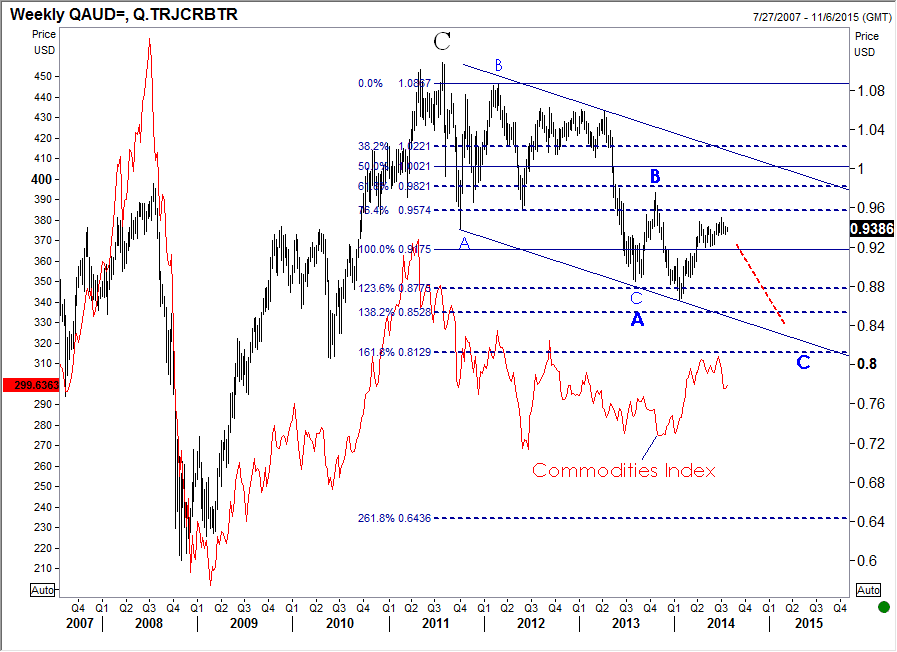Quotable
“You are a slow learner, Winston.""How can I help it? How can I help but see what is in front of my eyes? Two and two are four."
"Sometimes, Winston. Sometimes they are five. Sometimes they are three. Sometimes they are all of them at once. You must try harder. It is not easy to become sane.”
George Orwell, 1984
[I think of the US Federal Reserve Bank when I read Orwell’s quote.]
Aussie could suffer a lot more if Chinese debt matters
“Overall credit growth continues to outstrip growth in value added, which is not sustainable,” said Stephen Green, chief China economist at Standard Chartered.The Financial Times reported yesterday Chinese debt/gdp is now at a whopping 250%. I thought it was only the slovenly West that doled out debt in such large quantities in order to save its respective economies? Nothing like Westernizing is there...
The total debt-to-gross domestic product ratio in the world’s second-largest economy reached 251 per cent at the end of June, up from just 147 per cent at the end of 2008, according to a new estimate from Standard Chartered bank.
Even GaveKal, who seem to be quite smitten by China, sound concerned: “China’s current level of debt is already very high by emerging markets standards and the few economies with higher debt ratios are all high- income ones,” said Chen Long, China economist at Gavekal Dragonomics, a research advisory. “In other words China has become indebted before it has become rich.”

And from Reuters today, trouble in the Chinese construction industry indicating the real estate market is losing momentum at the least:
SHANGHAI, July 22 (Reuters) - Yields on a short-term bond issued by a troubled Chinese construction company have more than doubled in recent days as hope fades that the firm can avoid defaulting on Wednesday. On July 16, unlisted Huatong Road & Bridge Group Co Ltd announced that it was uncertain about its ability to make payment on a 400 million yuan ($64.4 million) one-year bond issue that matures July 23, after its chief executive was placed under investigation for illegal behaviour.“The real estate sector in China accounts for 15 percent of China’s economy and impacts 40 other business sectors,” says Reuters.
So how is this debt problem and real estate linked? A great chart of this dynamic comes from the FT:

But many analysts imply rising debt in China doesn’t really matter much because China will keep rolling over bad debt problems into the balance sheets of Chinese banks. But Prof. Michael Pettis thinks it does matter; here is why...
At any rate for several years I have been arguing that the main reason analysts have managed to get China so wrong is because of their failure to understand the basic distortions driving the economy and one of the major consequences of these distortions is the creation of debt, which itself further impacts the evolution of these distortions. All rapid growth, Albert Hirshman argued in the 1960s and 1970s, is unbalanced growth, and in many if not most cases the kinds of imbalances that result from rapid growth may be acceptable and even necessary in a growing economy.
But as the economy changes, the nature and extent of the imbalances change too, and it is inevitable that eventually the system forces a reversal of the imbalances. This is especially true in countries, like China, with highly centralized decision-making. In these countries the imbalances can be taken to extremes impossible in other countries, thus creating all the more pressure for a reversal of the imbalances.
This means that in China, if you can figure out how the growth model works and how the model generates imbalances and debt, you can pretty much figure out logically, albeit fairly broadly, the various paths that the country must follow in order the reverse the imbalances.
Pettis, I believe correctly, argues China at this stage of development (and given the global backdrop) has two options: 1) sharp slowdown in GDP growth, or 2) continued unsustainable increase in debt.
Some implications of hiding the bad debt in China, according to Prof. Pettis:
1. China’s GDP may be overstated by as much as 20-30%.
2. Productivity numbers are biased upwards.
3. Losses rolled over do not just disappear [there are real implications even in a command-control economy.]
4. Effective transfer of this bad debt has fallen on the household sector; it reduces their consumption [which is the sector vital in making the transition to a more balanced economy.]
5. Bad debt must be assigned somewhere; socializing debt does not change this.
6. When debt stops being hidden, which seems part and parcel to real financial reform in China, GDP growth will become biased downward.
7. Three places China can assign the bad debt: households, business, or government.
8. Assigning debt and slowing GDP does not necessarily lead to crisis. If the household sector is not assigned, income will grow despite a lower GDP. Rising household income equals a stable social environment and aids the transition to more healthy domestic demand. T
Thus, it seems likely sooner rather than later China’s GDP growth will decelerate faster than is now expected. And though this may be a healthy change for China as malinvestment is reduced, it will likely not be a healthy change for its raw-material satellite country, aka Australia.
This resource demand aspect of the China story triggered by rising debt and overinvestment, which to reiterate doesn’t necessarily lead to crisis for China, is the a big part of why I expect the Aussie to grind lower in the months ahead (which would be quite welcomed by the Australian central bank by the way). Here is our weekly chart view for the Aussie possibly heading to the low 80’s:

Recommended Content
Editors’ Picks
EUR/USD edges lower toward 1.0700 post-US PCE

EUR/USD stays under modest bearish pressure but manages to hold above 1.0700 in the American session on Friday. The US Dollar (USD) gathers strength against its rivals after the stronger-than-forecast PCE inflation data, not allowing the pair to gain traction.
GBP/USD retreats to 1.2500 on renewed USD strength

GBP/USD lost its traction and turned negative on the day near 1.2500. Following the stronger-than-expected PCE inflation readings from the US, the USD stays resilient and makes it difficult for the pair to gather recovery momentum.
Gold struggles to hold above $2,350 following US inflation

Gold turned south and declined toward $2,340, erasing a large portion of its daily gains, as the USD benefited from PCE inflation data. The benchmark 10-year US yield, however, stays in negative territory and helps XAU/USD limit its losses.
Bitcoin Weekly Forecast: BTC’s next breakout could propel it to $80,000 Premium

Bitcoin’s recent price consolidation could be nearing its end as technical indicators and on-chain metrics suggest a potential upward breakout. However, this move would not be straightforward and could punish impatient investors.
Week ahead – Hawkish risk as Fed and NFP on tap, Eurozone data eyed too

Fed meets on Wednesday as US inflation stays elevated. Will Friday’s jobs report bring relief or more angst for the markets? Eurozone flash GDP and CPI numbers in focus for the Euro.